
Topics
Guests
- Stephen Cohenprofessor emeritus of Russian studies and politics at New York University and Princeton University. His most recent book is Soviet Fates and Lost Alternatives: From Stalinism to the New Cold War. He recently co-wrote an article for The Nation with Katrina vanden Heuvel, “Cold War Against Russia—Without Debate.”
Pro-Russian groups have claimed a landslide victory for a hastily organized referendum on self-rule in two parts of eastern Ukraine. The vote was held in the regions of Luhansk and Donetsk less than two months after residents in Crimea voted to secede from Ukraine and join Russia. The Russian government says it respects the results of the referendum but has not indicated any plans to annex eastern Ukraine like it annexed Crimea. The referendum was held under chaotic circumstances with irregular voting conditions and violence between pro-Russian and pro-Ukrainian forces. We are joined by Stephen Cohen, professor emeritus of Russian studies and politics at New York University and Princeton University.
Transcript
AMY GOODMAN: We turn now to Ukraine, where pro-Russian groups have declared independence from Kiev following a hastily organized referendum on self-rule in two parts of eastern Ukraine. The referendum was held in the regions of Luhansk and Donetsk, less than two months after residents in Crimea voted to secede from Ukraine. Roman Lyagin served as the head of the de facto electoral commission for Sunday’s referendum.
ROMAN LYAGIN: [translated] These results only mean that the people of Donbas demand their opinion be respected, the norms of international law be respected. We demand the right for self-determination, and we will strive toward this. We understand perfectly that no one in the world will recognize this. European organizations and countries in the whole world will not recognize it. But we would like to be listened to, and that is why we held this people’s referendum organized by the people.
AMY GOODMAN: Earlier today, British Foreign Secretary William Hague dismissed the results of Sunday’s referendum in eastern Ukraine.
FOREIGN SECRETARY WILLIAM HAGUE: These votes, these attempts at referendums, have zero credibility in the eyes of the world. They are illegal by anybody’s standards. They don’t meet any standard, not a single standard of objectivity, transparency, fairness, of being properly conducted as a public referendum or election. And, indeed, the people organizing them didn’t really even pretend to meet any of those standards. The important thing is that the Ukrainian elections go ahead on the 25th of May.
AMY GOODMAN: Russian Foreign Minister Sergey Lavrov says that Moscow respects the results of the referendum, but he did not indicate any plans for Russia to annex eastern Ukraine like it annexed Crimea following a similar referendum in March.
FOREIGN MINISTER SERGEY LAVROV: [translated] We respect the will of the residents of the Donetsk and Luhansk regions, and we are of the position that practical implementation of the results of the vote will be carried out in a civilized way, without repetition of violence, through a dialogue between representatives of Kiev, Donetsk and Luhansk.
AMY GOODMAN: To talk more about Ukraine and what Sunday’s referendum will mean, we’re joined by Stephen Cohen, professor emeritus of Russian studies and politics at New York University and at Princeton University. His most recent book, Soviet Fates and Lost Alternatives: From Stalinism to the New Cold War, which is out in paperback. He recently co-wrote an article for The Nation with Katrina vanden Heuvel headlined, “Cold War Against Russia—Without Debate.”
So, the significance of this election, Professor Cohen?
STEPHEN COHEN: Which one? The referendum yesterday?
AMY GOODMAN: The referendum yesterday.
STEPHEN COHEN: Well, it’s going to make relations between Moscow and the United States and Europe worse. But it shouldn’t, because a bunch of people decided to have a referendum, which is no more or less legal than the government in Kiev, which came to power from the street. What’s interesting about it is, is that it went off with a minimum of violence, and it tells you that a lot of people down there want—you know, we had a revolution where one slogan was “no taxation without representation.” They’re saying, “no government—no governance without representation in Kiev.” They want some form of home rule. It’s not about joining Russia, for the most part. I think no more than 17 percent in a poll said they’d like to join Russia. This is about having a voice in the future Ukrainian state.
AMY GOODMAN: Explain the referendum. In fact, it wasn’t like Crimea when it said, “Do you want to become a part of Russia”?
STEPHEN COHEN: Yeah—
AMY GOODMAN: This was about—it was vague.
STEPHEN COHEN: It’s less than vague. About three or four months ago, maybe a little less, in Donetsk, people who were unhappy, very political people who were unhappy with the Kiev government, formed something called the People’s Autonomous Republic of Donetsk. Donetsk is an enormous province. It’s where a lot of the heavy industry, a lot of the hub of the natural gas supplies lines to Europe go from Russia through Ukraine. It really is the industrial heartland of Ukraine. And they said, “We’re declaring home rule.” They weren’t elected. It just came from the street. Now they put on a referendum that says, “Do you approve of what we did? We created an autonomous republic; do you approve of that?” That’s all it was.
Now, what they’ve said, and the guy you had, Roman, who was reporting from Ukraine, said, “We don’t know what we’re going to do next. We might have another referendum. It may be about a federal constitution. It may be about joining Russia. We have to see what the people want.” But you’re right: All it’s doing is saying we now have in Donetsk and in Luhansk and in these areas of eastern Ukraine a government approved by the people, people who don’t approve of the government in Kiev. Now, you could spin that into something very positive, if Washington wanted to push its client state in Kiev to that. It could say, “OK, it’s time to negotiate. Kiev should begin, instead of sending troops there, which it’s been doing for the last two weeks, it should send a delegation to negotiate with these people who have been affirmed by the referendum. But that’s not happening.
AMY GOODMAN: Can you talk about the violence? It was just outside of the city of Donetsk. Apparently, at least one pro-Russian demonstrator was killed when members of the National Guard seized control of City Hall in an apparent attempt to prevent the referendum from taking place there.
STEPHEN COHEN: If you’ll permit me, I don’t think we can look at the death of that person—and I think there were more than that who died—outside the context of what has happened since the Kiev government. Now, let our—let our viewers be clear: This Kiev government is the government that came to power without legality. You can accept it or not accept it, but it is the government that is embraced 100 percent by Washington and by Europe. It is our government. This government sent troops to eastern Ukraine. That’s about—seems to be about 10,000-15,000, maybe not that many, but tanks, armored personnel carrier, heavy artillery, with helicopters flying over. And they flew over these cities that we’re discussing. Now, remember, please, what happened in Odessa about 10 days ago. I trust your listeners and viewers will remember, 40 people were burned to death in a building. That’s a horrific event. Then—
AMY GOODMAN: And who did that?
STEPHEN COHEN: Let’s come back to that. Then, a day or two after that, Ukrainian troops from Kiev entered the city—entered the city, 500,000 people, right into the residential area where people live, with parks, with mothers and fathers with their kids strolling in the park—sent tanks and armored personnel carrier into that city and opened fire. All right, put that together with Odessa. That’s horrific. It doesn’t matter who began that. It doesn’t matter if two guys in the street after a soccer game began punching each other. What government sends tanks into a city when there’s nothing happening in the city that provokes you?
And here’s the second part of the story. Personally, this outrages me. I don’t know how your viewers and listeners think. But what did the United States government say? Did it say, “We regret the loss of life”? Did it say, “There should be an investigation”? No. It said Kiev has the right to restore law and order. Now, I would stretch this out. If a war crime was committed in Odessa by the burning of 40 people to death in a building and by tanks entering the streets of Mariupol, or any other city, if that’s a war crime, we didn’t commit it, but we applauded it. And there’s something wrong there, no matter who’s right and wrong in this dispute. And that, when the referendum took place—and you asked about the shooting—the Kiev government tried to intimidate people going to the votes by opening fire on some areas outside the city. They failed. The turnout was large, not as large as the autonomy people are claiming it was, but it was large.
AMY GOODMAN: This is Russian President Vladimir Putin, who arrived in Crimea Friday in his first visit to the region since it was annexed by Russia in March. He gave thanks to military veterans during his visit, marking Victory Day, commemorating the anniversary of Germany’s surrender to the Soviet Union in 1945.
PRESIDENT VLADIMIR PUTIN: [translated] We hold you as an example, our dear veterans. And there is a big moral input on your side, in that Sevastopol and Crimea are back to Russia. You transferred to us the great values of unity, fairness, solidarity. You taught us to act according to our conscience. The generation that grew up in Sevastopol has always acted according to those values. I am sure that 2014 will go down in the history of Sevastopol, in the history of our whole country, as a year when all the citizens here, the people, resolutely decided to be together with Russia.
AMY GOODMAN: That’s Russian President Vladimir Putin in Crimea Friday. Professor Stephen Cohen?
STEPHEN COHEN: I have a flashback. Not exactly like this, but when I was a kid growing up in Kentucky and Indiana, we had something called VE Day, Victory in Europe Day. That’s what Russia calls Victory Day. It represents the victory over Nazi Germany in Europe. We seem not to do VE Day in this country anymore, unless Spielberg and Hanks make a movie about World War II. But for Russia, May 9th—it was May 8th in America because of the time difference—is the most sacred secular holiday. I’ve been going and living in Russia for 40 or 50 years. It’s true that the government, going back to the Communists and carrying through Putin, manipulate this holiday—it’s absolutely true—for their own political purposes. But this is one holiday that 95 percent—90 percent of Russians feel in their hearts. It’s deeply meaningful, even though it’s almost 70 years after World War II. And it’s meaningful because when we say 27.5 million Soviet citizens died defeating Nazi Germany in Europe—and it was the Russians who defeated—the Soviet Union who defeated Nazi Germany in Europe—that that means that virtually every family in Russia lost somebody whom they still mourn. All right, Putin was tapping into this on May 9th. But it’s authentic. It’s meaningful. And my—when I look at these films, I remember—it tells us how different our two countries are. We no longer memorialize World War II, except for Hollywood movies, whereas for Russia it’s just a sacred holiday.
AMY GOODMAN: I want to go to the Ukrainian prime minister now, Arseniy Yatsenyuk. He was speaking at an event in Kiev commemorating Victory Day, again, which marks the anniversary of Germany’s surrender to the Soviet Union in ’45.
PRIME MINISTER ARSENIY YATSENYUK: [translated] Sixty-nine years ago, we were fighting shoulder to shoulder with Russia against fascism. And we won. But today, Russia started a war against Ukraine, and history is repeating itself in a different way. Russia has to stop supporting terrorists who are killing peaceful people in Ukraine and against whom we have started an anti-terrorist operation. Our country needs unity, dialogue and peace. But peace will come when terrorists are not supported by Russia, which 69 years ago was standing shoulder to shoulder with us. And today it is Germany, Great Britain and the United States who are standing shoulder to shoulder with us.
AMY GOODMAN: That was Ukrainian Prime Minister Arseniy Yatsenyuk. Professor Cohen?
STEPHEN COHEN: He’s our man. He’s the one that Virginia [sic] Nuland, you remember on the tape—
AMY GOODMAN: Victoria, yeah.
STEPHEN COHEN: —we heard, wanted him as prime minister, and they got him.
AMY GOODMAN: They call him—she was calling him on that tape “Yats.”
STEPHEN COHEN: Yats, yeah. Well, it’s hard to pronounce Yatsenyuk, but Yats to us, and Klitsch for Klitschko. We tend to—stop and think, please, Amy, what the language is here and what the danger is. Yatsenyuk, who’s the prime minister, is responsible for sending armored troops from Kiev to eastern Ukraine, where the pro-Russian or anti-Kiev forces are. They call it an “anti-terrorist operation.” Anti-terrorist operation. And these are also Ukrainians living there. Where’s the terrorism that’s been created in eastern Ukraine? I know of none. But they’re using this language, “anti-terrorism.” What are the East Ukrainians—what language are they using to refer to Yatsenyuk? “Fascist.” So you’ve got a government in Kiev sending troops against people in eastern Ukraine on the grounds that they’re terrorists—they are not—and you have the insurgents, let’s call them that, in eastern Ukraine referring to the government as “fascist.” That’s how far apart these people are, and all this on the 69th anniversary of World War II, when Ukraine and Russia lost millions of people to actual fascists. This is how bad it is. The false statement he made, and the premise on which American policy is being made, is that Putin attacked Ukraine and began this whole mess. Whatever you think about what the outcome should be, that is just factually untrue. All of this began when the United States and Europe asked Ukraine back last November to make a decision between Russia and the European Union. That triggered the protests that led to this.
Here’s the tragedy: People are dying when there’s a perfectly accessible way to negotiate. And it’s not my idea; it’s the idea proposed by Angela Merkel of Germany, that there be a roundtable. And Putin—in Ukraine, of all the conflicting Ukrainian forces. That would be West Ukraine, Kiev, eastern Ukraine. And Putin said a few days ago in that famous statement where he said that he’d pull the troops back, and we say he’s lying, and then somebody said we’ve got to wait for the satellite pictures—he said, “I just talked to Merkel, and Merkel says there should be a roundtable in Ukraine of all the combatants in Ukraine.” And he said, “I agree. Let’s do this.” So Russia wants these negotiations inside Ukraine. Germany, the most powerful nation in Europe, wants them. The EU wants them. Washington is silent. What is going on? If we want negotiations, Merkel said, “Here,” and not a word. Even though Merkel was here last week, with Putin, and the only thing they discussed publicly was Snowden’s revelation that we had tapped her cellphone. She’s still aggravated about that. But they didn’t mention this proposal of hers. And the German authorities have not denied that she made the proposal to Putin. It’s a way out. And we’re silent.
AMY GOODMAN: I wanted to go to Henry Kissinger, the former secretary of state, speaking about Vladimir Putin in what might be behind Russia’s recent policy towards Ukraine. He was talking to host Fareed Zakaria on CNN.
HENRY KISSINGER: I don’t think that he had planned to bring it to a head now. I think he had planned a more gradual situation. This is sort of a response to what he conceived to be an emergency situation. Of course, to explain why he did it doesn’t mean one approves annexing part of another country or crossing of borders. But I think we ought to settle the Ukraine issue first and then have a discussion about relations with Russia.
AMY GOODMAN: That’s Secretary of State Henry Kissinger. Professor Cohen?
STEPHEN COHEN: Well, it’s perfectly sensible, and the story on the street is Obama will not see Kissinger. So, as they say, go figure. I mean, we used to have a lot of so-called senior statesmen, wise men, wise women, that presidents turned to in emergency. I can’t think of one whom Obama turns to. Now you’ve got Henry Kissinger. Think what you will about his past, but he sees Putin, personally and alone, two times a year. They talk. Kissinger comes from Europe, from Germany. He understands what’s going on. He’s preaching a course of negotiation. And Obama, though Kissinger—my understanding is; it may be wrong—Obama has declined to see Kissinger. Why in this crisis, when we can imagine war with Russia, would you not want to spend an hour with Kissinger?
AMY GOODMAN: I want to turn to the upcoming national election scheduled for May 25th in Ukraine. On Tuesday, Secretary of State John Kerry criticized Russia’s call for Ukraine to postpone the election.
SECRETARY OF STATE JOHN KERRY: It’s very hard to reconcile that Russia is now making the argument that Ukraine ought to reduce—not have an election or postpone an election because of the violence that’s taking place, but Russia is full, whole-hog behind having an election in Syria, where there is far worse violence. Reconcile that one for us, please.
AMY GOODMAN: That was Kerry.
STEPHEN COHEN: That was Kerry, who has now become secretary of war, and not secretary of state. He’s supposed to be our chief diplomat. And I don’t recall, in the last two weeks, him uttering a word about any kind of diplomacy. Why he’s so embattled, I don’t know. I don’t know when he made that statement, but let’s remember what Putin said—was it last Thursday—because this clip that you showed may be a little out of date. Putin said—and it’s very important—Russia had been opposed to the presidential election in Ukraine on the 25th. That’s what? Two weeks from yesterday, I think.
AMY GOODMAN: He spoke on Tuesday. This was him speaking on—
STEPHEN COHEN: Then this is a little out of date, because on Thursday, I believe, Putin said, essentially, this: “You want to have a so-called presidential election in Ukraine. It is a crazy idea, but please go ahead. We won’t interfere.” And it is a crazy idea. May I say why it’s a bad idea? Now, remember, we’ve drawn a new red line. We’ve said to Russia, “If you interfere in any way with this presidential election in Ukraine, we will impose more sanctions on you.” So that election is very important to the United States, because we want to bestow some legitimacy on the unelected government in Kiev by giving it an elected president.
What kind of election, Amy, can take place in eastern Ukraine? Because it’s supposed to be a national election, western and eastern and central. What kind of election can take place while Kievian tanks are firing on East Ukrainian cities? Now, you could say, “Well, they’ll stop firing on the day of election.” But what’s going to be the impact on East Ukrainians, particularly since they have no candidate? Their parties are on the run. The two candidates who propose to represent eastern Ukraine in the national election two weeks ago went to a TV studio, like this one, in Kiev to participate in a national debate and were beaten up in the streets before they could enter the building. This is a presidential election. So, what’s more likely to happen, if this election happens, is it will be a step toward the further partition in Ukraine, because the president elected will be the president of Kiev, western Ukraine and parts of central Ukraine, and he or she—because there’s a woman candidate, though I don’t think she has a chance—will not be recognized by eastern and southern Ukraine. And that has absolutely nothing to do with Putin. So that will be a step toward partition.
If you really want to solve the problem, you go back to the European Union proposal in February that you have elections in December; you give everybody six, seven months’ chance to organize; and you have parliamentary elections, as well—because the United States is right, democratic theory is right: The essence of the democratic government is not a president, but a parliament. You need a new parliament—they’ve got a runt parliament—and they need a new constitution. A president can’t enact a new constitution in Ukraine. You need some sort of constitutional assembly. Why are they rushing 'til May? And the only reason is, is the United States wants to give some legitimacy to this government in Kiev. But I think any political scientist, any constitutional lawyer would tell you, you've got to wait, you’ve got to do it right.
AMY GOODMAN: You mentioned President Obama meeting with Angela Merkel. This is President Obama speaking when Angela Merkel, the German chancellor, came to Washington, D.C.
PRESIDENT BARACK OBAMA: The Russian leadership must know that if it continues to destabilize eastern Ukraine and disrupt this month’s presidential election, we will move quickly on additional steps, including further sanctions that will impose greater cost. But that is a choice facing the Russian leadership. Our preference is a diplomatic resolution to this issue, and the Ukrainian government has already shown itself more than willing to work through some of the issues that would ensure that the rights of all Ukrainians are respected, that you have a representative government.
AMY GOODMAN: That was Obama.
STEPHEN COHEN: It certainly was. I mean, the question is—if you were at a press conference with him and he would take your question, you would say, “Are you saying that all the unrest in eastern and southern Ukraine is caused by Russian meddling?” If he said yes to that question, that would mean he’s completely uninformed, and he needs new advisers. Or if he said, “Only partially,” then the follow-up question: Are we doing anything to increase the unrest, as in enabling our government in Kiev to open fire with tank cannons on cities? Does that increase unrest? Of course it does. But to blame Russia for everything that’s happening now is simply factually preposterous.
AMY GOODMAN: And this is the IMF. Late last month, the International Monetary Fund approved an aid package for Ukraine. IMF Managing Director Christine Lagarde announced the program.
CHRISTINE LAGARDE: Urgent action was necessary. Decisive measures were taken by Ukraine, and decisive measures have just been taken by the IMF. So there has been a very strong endorsement for the program, which will release, over the course of the next two years, $17.1 billion in different installments over the course of those two years.
AMY GOODMAN: That was the IMF managing director. Your response and where you think Putin is going to go right now?
STEPHEN COHEN: Well, on the IMF, we’ve seen what IMF help means to a country: You don’t get the money without strings attached. And the strings are what we call austerity. That means pensions will be reduced; salaries paid by the state to federal employees will be reduced, or people laid off. That means all the utility prices in the country will go up, probably 50, maybe 100 percent. That means that the job market will contract. There will be more unemployment. So, the upshot, if you’re worried about destabilizing Ukraine, the IMF will now become, with these measures, if they enact them, the main destabilizer.
But let’s look at the humorous or ironical part of it. The first part of the money was paid, I believe, this week, $3.5 billion. It’s approximately what Ukraine owes Russia for natural gas already delivered. So Russia is saying, “Great, just have the IMF send the check to us.” That will be decided in the next few days, because Russia said, “If we don’t get paid, we aren’t going to send any more natural gas.” And that natural gas—it’s not winter now, but you still need it to turn the lights on—that goes on to Europe. So, Russia is not opposed to the IMF paying Ukraine’s bills.
The reality, though, Amy, is, is Ukraine is not going to get $17 billion in the next few years. A lot of that’s in the form of loans, which it has to repay. And the problem that Ukraine now has is it has billions and billions of dollars of foreign debt that it cannot pay. And to add more debt—we did this to Russia in the 1990s. We said, “Here’s $5 billion. By the way, please pay it back in two years.” How can they pay it back, with interest? They can’t do it. This is a burdensome program. It isn’t going to save the day.
AMY GOODMAN: And finally, what Russia—what Putin is doing, talking about pulling back, discouraging the vote that just took place from actually taking place?
STEPHEN COHEN: You know, here it goes to the way you see this whole crisis. I’m attacked as a Putin apologist for saying something that seems to me to be empirically true, but you’re not supposed to say it in the United States. And I’m grateful that you allow me, and others—you’ve had others on who have said it—to say this. Putin didn’t want this Ukrainian crisis. He didn’t begin it. But he is Mr. Pushback. When you meddle with Putin, you’re asking for a fight. But he still wants this situation de-escalated and stabilized. He believes that the main factor of destabilization is Kiev sending armed forces to Ukraine and firing on civilians. He’s calling on the United States to stop that. He believes—
AMY GOODMAN: On eastern Ukraine?
STEPHEN COHEN: In eastern Ukraine. He believes that once that stops, it is relatively easy to find negotiations to demilitarize the crisis.
AMY GOODMAN: You don’t think he wants eastern Ukraine, to annex it?
STEPHEN COHEN: What is he going to do with it, Amy? What is he—what is he going to do with it? I mean, it would enormously—let me point out that one reason so many people in Crimea wanted to join Russia is pensions automatically double. I mean, Russia has its own economic problems. What it does want, 100 percent, is continuing economic relations with eastern Ukraine. It’s integral to the Russian economy. Putin’s position is trade with the European Union, trade with Russia. Why did Europe say you can only trade with one or the other? But why would Russia want to take eastern Ukraine is—and, in fact, if you asked me, “Are there Russian agents in eastern Ukraine?” I would say, “I certainly hope so,” to help control a movement that Putin can’t control. You don’t want things spinning out of control in eastern Ukraine.
AMY GOODMAN: We’re going to leave it there, Stephen Cohen, professor emeritus of Russian studies and politics at New York University and at Princeton University. His most recent book, Soviet Fates and Lost Alternatives: From Stalinism to the New Cold War, out in paperback. And we’ll link to the piece that you wrote with Katrina vanden Heuvel in The Nation magazine, “Cold War Against Russia—Without Debate.”
This is Democracy Now! When we come back, what does CIA have to do with polio in Pakistan? Stay with us.

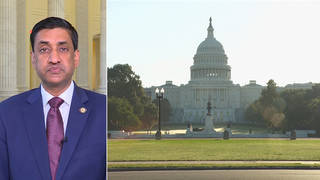
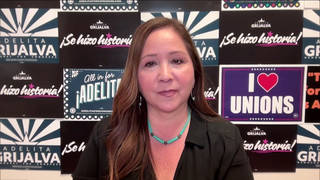
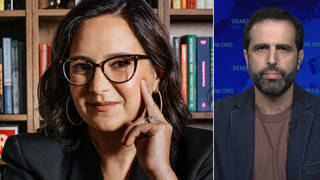
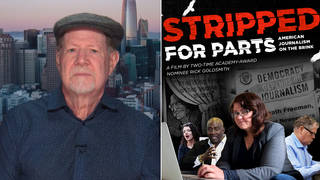





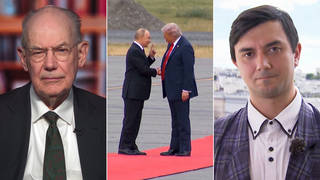

Media Options